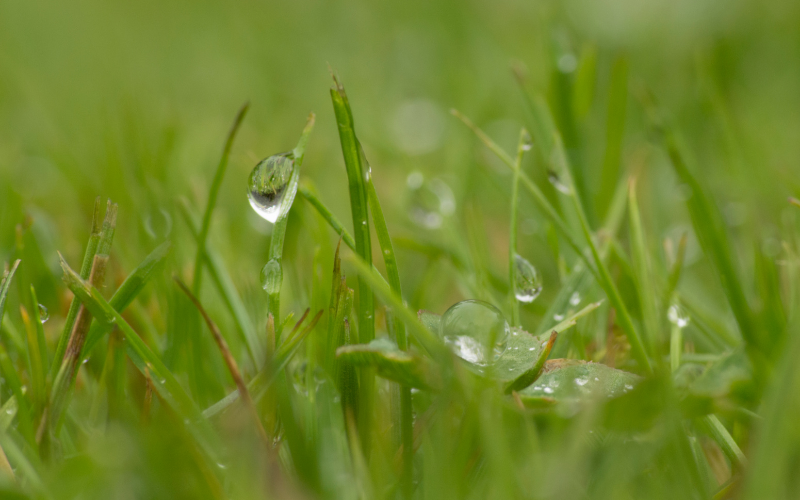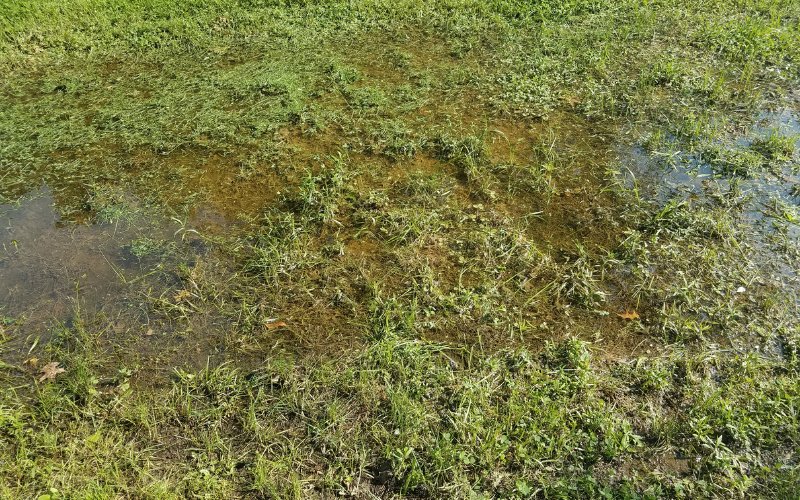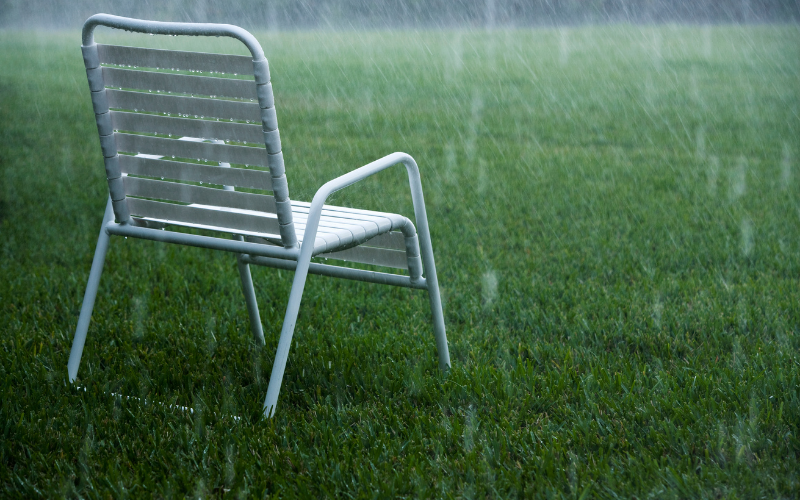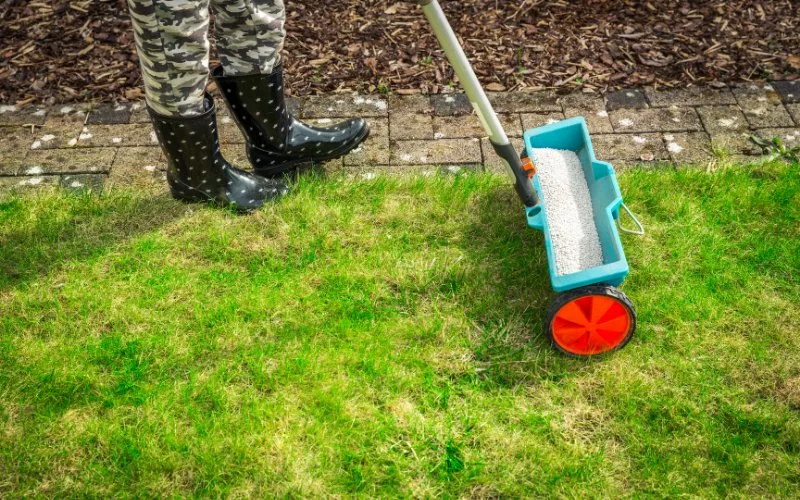Fertilizer can be tricky. When should you apply it? How much should you apply? How many fertilizers do you need to use? And just when you figure all of this out and you’re about to apply your fertilizer, it starts to rain. Then it keeps raining for hours. Can you apply your fertilizer now? Do you need to wait for your lawn to dry? If you do apply your fertilizer, do you still need to water it in? All of these questions are answered in the article below.
Can I Apply Fertilizer to Wet Grass?
Yes, you can apply fertilizer to wet grass and this may even improve the effectiveness of the fertilizer. That is, provided that the grass is not waterlogged and that you are using granular or liquid fertilizers that are meant to be diluted. Foliar fertilizer should never be applied to wet grass.
What Happens If You Apply Fertilizer to Wet Grass?
Fertilizer applied to grass that is damp or wet but not soggy will be just as effective as fertilizer applied to dry grass. Fertilizer applied to waterlogged grass or grass that is in soil that has standing water on top of it may be diluted so much that it will lose 60% or more of its potency.
Foliar feeds applied to wet grass, though uncommon, are less effective and may not stick to the blades of grass if they are applied while the grass is still wet. Waiting at least 24 hours after rain or watering to apply the foliar fertilizer and another 24 hours before watering the lawn again will help ensure that you get the most from any foliar fertilizers.
How Wet is Your Lawn?
The first step to knowing whether or not you can apply your fertilizer, or knowing how long you need to wait before applying fertilizer to your lawn, depends on how wet your lawn is.
Damp After a Light Rain or Regular Watering
If your lawn is damp, there will be droplets sticking to the blades of grass by the ground between and underneath the blades won’t be muddy in the least. If you have sandy soil, the ground may even feel a bit dry. This is the ideal situation for applying fertilizer as usual. You’ll still need to water it in a little, but only about half as much.
Soaked After Heavy Rain or Deep Watering
Many granular fertilizers require that you deeply water your lawn before or after application. This usually means running your sprinklers or a hose over your lawn evenly for about 20 to 30 minutes. 1 to 3 hours of steady rain can also accomplish this task. Allow another hour or two for the water to settle. When it does, there should be no puddles or standing water. The grass should not move or shift if firm pressure is applied with your hand or foot.
If your lawn meets all of the above criteria, it should be safe to apply any standard liquid or granular fertilizer, but liquid fertilizer should not be watered further. Granular fertilizer should only be watered in briefly to help the particles to set.
Waterlogged or Flooded
If your lawn is waterlogged or flooded, there will be pools or standing water above the ground and around the base of the blades of grass. In these conditions, nothing should be added to the fertilizer. Even foliar feeding should be avoided until the pools clear up, even if the blades of grass are dry.
Hydrophobic and Special Circumstances
There is one condition where the grass and ground may appear dry or damp but when fertilizer should not be applied. This is when water will not be absorbed by the soil and runs off. Hydrophobic soils repel water. These can occur because of a lack of humus in the soil, clay compaction, or severe periods of dryness and hot temperatures. This condition must be corrected before applying any fertilizer or the fertilizer, like the water, will only run off the soil and will not be effective.
Foliar feed may help circumvent this problem temporarily, but the lack of water and air will cause the grass to die unless the root of the problem is addressed. Manual or chemical aeration is often the first step in correcting this soil issue.
Can You Fertilizer Grass in the Rain?
As long as you have a good applicator that will not be affected by the rain and the rain is light, applying fertilizer in the rain is a possibility that should have no adverse effects. However, it’s often best to apply fertilizer before or after the rain as this allows you to inspect the grass and soil to make sure it’s not too damp. Applying the right amount of water to the fertilizer is key to making the most of it.
Application of Different Lawn Fertilizer Types on Wet Grass
How wet the grass can be when you apply fertilizer depends on the type of fertilizer you intend to use.
Liquid Fertilizers and Teas
Liquid fertilizers and compost or manure teas can be applied to damp or even soaked ground but damp or dry ground is preferred. Liquid fertilizer of any kind should never be applied if there is standing water or if water tends to run off of the ground when applied.
Granular Fertilizers
Granular fertilizers are the most forgiving when applied to wet grass. They can be applied to a damp or soaked lawn to help conserve water and air in the absorption process. If applied to a lawn with standing water or deep mud, the granular fertilizer may dilute quickly and lose some but not all of its effectiveness.
Foliar Feed or Foliar Fertilizer
Foliar fertilizers are the only type of fertilizers that should never be applied to wet grass of any kind. To be effective, foliar fertilizer must be applied to dry grass and it’s even recommended to skip watering the day or afternoon before a foliar fertilizer is applied in mild conditions.
What Happens if You Apply Fertilizer to Wet Grass
If you plan to apply fertilizer to wet grass, make sure that the grass is wet or even soaked but not waterlogged or hydrophobic, using the criteria mentioned above. Liquid and granular fertilizers may be applied to wet or soaked grass after it rains to make the most of the water you have. Foliar feed should never be applied to wet grass or grass in, near, or around standing water.
If you do happen to apply foliar fertilizer to wet grass, you will need to apply more after the grass dries as the first application is likely to be ineffective. If you applied liquid fertilizer to wet or waterlogged grass, the fertilizer is likely to be less effective but not ineffective. Granular fertilizer will not retain its full potency if applied to standing water, but it will lose the least potency.






Leave a Reply